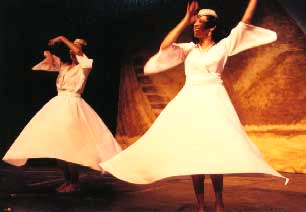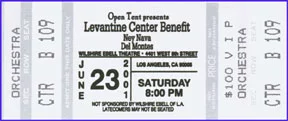back

Ney Nava Dance Theatre

Adam & Laila del Monte
Support Levantine Center
order your souvenir tickets today
by phone: 323/650-3157
On June 23, 2001, 8 pm, Ivri-NASAWI and Open Tent organized a benefit for the Levantine Center in Los Angeles. This concert featured the contemporary and classical Persian dance of the Ney Nava Dance Theatre, and the new "El Azahar" flamenco/Middle Eastern fusion from Adam & Laila Del Monte with special guest artists John Bilezikjian, Marysol Fuentes, Afaf del Monte and Patric Oliver, along with flautist Roberto Vergara and guitarist Tony Ybarra. The concert took place at the Wilshire Ebell Theatre. It was glowingly reviewed by both the Los Angeles Times and La Opinión.
Although you may have been unavailable to attend in Los Angeles on June 23, you can still purchase souvenir tickets for $100, $35 & $25. Buy a group of souvenir tickets to benefit the center. Call 323/650-3157.Support the Levantine Center, a new paradigm for
Middle Eastern cultures and coexistence.
Culture is what people lean upon
for their very psychic survival.- Randall Robinson
"Any relationship to Israel must include a relationship to the Middle East. We cannot continue traveling back and forth to Jerusalem, and pretend that Damascus, Tripoli, Sidon, Fez and Baghdad do not exist."
- Ammiel Alcalay
Levantine Center will be a gathering place for all Mediterranean and Middle Eastern cultures, irrespective of ethnic, national or religious boundaries. The spirit of the center reflects a cooperative, pluralistic, creative, intellectual and historically interwoven region---not a fractious Middle East of warring ideologies.
- Jordan Elgrably
Ivri-NASAWI and the Levantine Center Project
[Los Angeles, June 2001] In 1996, with Victor Perera, Ruth Behar and Ammiel Alcalay, I founded a national grassroots organization to promote awareness of Sephardi/Mizrahi cultures and creative expression. We all believed that the American Jewish experience was criminally neglecting a rich spiritual and artistic heritage, that of the Iberian and Middle Eastern Jewish experience. We also remarked how even Sephardi and Mizrahi Jewish identities were positioned with Israel, against the Arab world, when what was clearly needed was a discourse of coexistence.
Ivri-NASAWI, the New Association of Sephardi/Mizrahi Artists & Writers International, became the first group of its kind in the United States, and was soon joined by an additional cofounder, Ella Habiba Shohat---an Israeli of Iraqi origin who has been outspoken about the rights of Middle Eastern Jews in Israel, and our cultural history's marginalization, not only in Israel but in the U.S. and Europe. We were also joined early on , a writer and activist in the Syrian community in Brooklyn, and Joyce Allegra Maio, who is our director in Manhattan.
Ivri-NASAWI has organized dozens of programs since January 1997, in Los Angeles, New York, the San Francisco Bay Area and in Washington, DC. These include presentations of new books and their authors, such as Let Jasmine Rain Down, about the musical culture of Syrian Jews; an annual Sephardic Arts Festival at the Skirball Cultural Center in L.A. which has attracted as many as 4,000 people each year on a Sunday; a salon series called "Conversations on Roots & Identity" during which we have explored the stories of Jews of Morocco, Iran, Libya, Egypt, Iraq, Syria and others; and the Poetry of Peace concert in which Omar Faruk Tebilek, an Egyptian/Turkish Muslim sufi and his ensemble shared billing with an Israeli Mizrahi group, Sheva: a spiritual evening which was a highlight in the World Festival of Sacred Music in L.A. in 1999; we've also created "An Evening with Elias Canetti," with our friends at the Villa Aurora, exploring the life and work of this Sephardic winner of the Nobel Prize for Literature.
In short, Ivri-NASAWI has not only reached many thousands of people through the creation of public programs in cooperation with institutions which have their own addresses (Getty, Skirball, Poetry Center in SF, Symphony Space in NY, Beyond Baroque, L.A. Public Library, Makor in NY etc.); we have also consistently acted as an advocacy organization: writing letters to newspaper and magazine editors, introducing writers to editors, introducing artists to galleries and museums, introducing artists and writers to each other; and introducing many to the spiritual teachings of rabbis living and dead, as well as introducing Sephardim and Ashkenazim to the literary works of Sephardim who need to be better-known; for example, Edmond Jabes, the Egyptian Jewish author of a fascinating series, entitled The Book of Questions, which is based on rabbinical commentary but is a kind of prose poetry which examines the philosophy of our times.
Ivri-NASAWI has been a grassroots organization. That's a nice way to describe us. In fact, we've been a shoestring operation: some very hard-working people, laboring without pay and without much of a budget, creating at times some highly successful programs. While this may be admirable, it's not the way to create a permanent and effective institution.
We now have a vision, and are completing a business plan, which creates a cultural center in Los Angeles with a chapter in New York and another chapter in the Bay Area. We call this the Levantine Center. Levantine Center will be the first center of its kind, a place where you'll find both Sephardic and Middle Eastern cultures, art, literature, music, workshops, classes on history, languages, great authors and more. It will be a gathering place for all the Middle Eastern cultures, a center for Jews and Arabs, Muslims and Christians. Levantine Center will reflect a cooperative, pluralistic, creative, intellectual, historical, cultural Middle East; not a fractious Middle East of warring ideologies.
Thus-far we have drawn in several interested organizations and individuals from diverse communities. These include Open Tent Middle East Coalition, Al Jadid magazine, the Persian Arts Society, and a number of artist groups, including Ney Nava Dance Theatre, Lian Ensemble, Al-Andalus and others.We would like to weave together as many individuals and organizations to take part in the creation of the Levantine Center as we can. This is not just another Jewish cultural center: this is in fact a new departure for a venerable, incredibly rich cultural history, that of Jews, Muslims and others of the region which brought the world out of the Dark Ages.
Our principal objectives are to raise:-$2-3 million for the foundation of the Levantine Center itself, with nascent chapters in New York, SF Bay Area and later Washington, D.C.
-$750,000-$1 million for the creation and first two years of budget for Levantine Review, a quarterly reflecting the values of the Center.
-$5-10 million for the creation of an oral history project which will eventually record the stories of up to 5,000 emigrés of the Middle East, North Africa, Africa, India and other parts not included in existing oral history projects of this kind.
We will need to hire a number of people to fulfill these projects, and we'd like to begin receiving resumes from those of you who may fit the following job descriptions:
executive director development director marketing director project director editor writer circulation manager fulfilment manager advertising manager director of music development curator archival librarian bookstore manager, cafe manager web master graphic designer.
For those who may be considering the viability of making a sizeable cash contribution to this tax-deductible endeavor, please contact us at your convenience, and we will happily send you a copy of the business plan.
For the first time, the United States will have its own Middle Eastern cultural institution, serving the needs of Sephardi/Mizrahi Jews as well as others of the countries in which they have lived. I believe Levantine Center will cause existing institutions such as the Jewish Museum in New York and the Skirball in Los Angeles, as well as the Spertus Institute of Jewish Studies in Chicago, to seriously sit up and examine why they have, for so long, basically ignored a very crucial aspect of Jewish cultural history; and why they have often had a resistance to positively representing Arab/Muslim cultures without exoticizing them.
I believe that if, as Sephardi/Mizrahi Jews, we continue to allow ourselves to be represented by others, we will succeed in destroying our own culture. We also cannot afford to see our cultures positioned outside the historical framework of the Middle Eastern and Mediterranean countries where our communities often thrived. Existing Jewish institutions have not succeeded in properly representing Sephardi/Mizrahi cultures. And few institutions anywhere are combining exploration of our cultures with those of the Arab/Middle Eastern world. They simply do not appreciate our music, our languages, our history. Perhaps understandably, they are Eurocentric in their thinking. We must be willing to create a new paradigm, just as we must be willing to encourage younger Sephardi and Mizrahi Jews in the United States to become artists, writers, historians, and community activists.
Levantine Center will provide impetus for all these needs; it will also serve as an important positive encounter point for Jews and Arabs, to reacquaint themselves with Al-Andalus and other periods of cooperative, multicultural history we share. Levantine Center will focus on coexistence and conflict resolution, not the preaching of nationalist and exclusionary ideologies. It will be a place where through culture we find our common desires and create lasting bonds of friendship.
Jordan Elgrably
Home Nasawi News Calendar Bulletin Board Poetry Art Links Membership Organization Archive Levantine Project Open Tent


